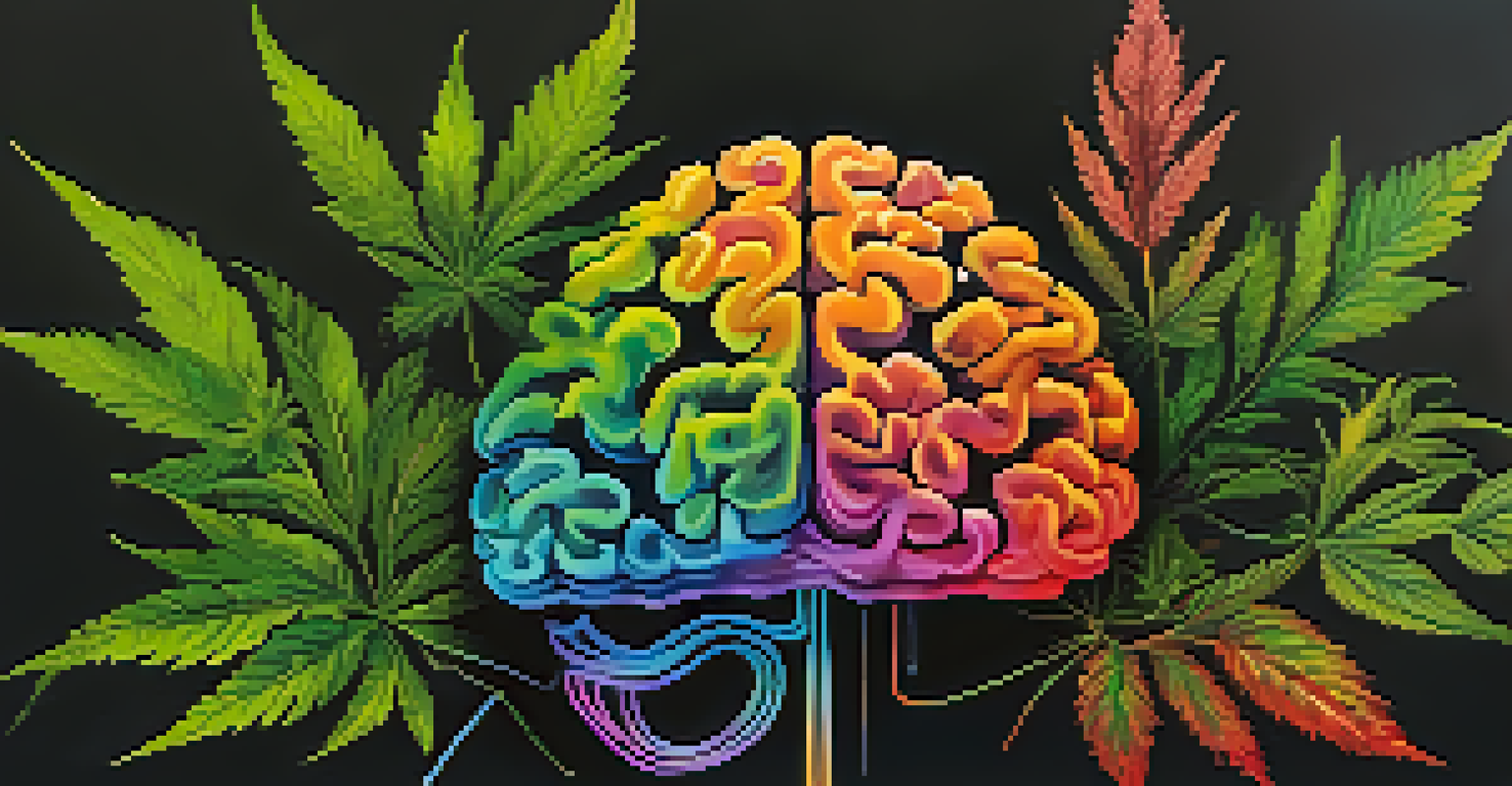Long-term Effects of Marijuana Use on Mental Health in Adults

Understanding Marijuana and Its Popularity in Society
Marijuana has seen a surge in popularity over the last few decades, especially with the increasing number of states legalizing its use. Many adults turn to marijuana for various reasons, including stress relief, recreational enjoyment, or even medicinal purposes. However, as its acceptance grows, it's crucial to understand the implications of long-term use on mental health.
Marijuana can be a double-edged sword; it can provide relief, but it can also lead to dependency and mental health issues.
The plant contains psychoactive compounds, primarily THC, which interacts with the brain's endocannabinoid system. This interaction can lead to altered mental states, affecting mood, perception, and cognitive functions. While some users may experience positive effects, such as relaxation or euphoria, others may face adverse reactions that could linger over time.
As we delve deeper into the long-term effects, we must consider not only the chemical composition of marijuana but also the individual differences in how people respond to it. Factors like genetics, mental health history, and frequency of use play vital roles in shaping the overall impact on mental health.
Potential Risks of Long-term Marijuana Use
While some individuals report benefits, long-term marijuana use can carry potential risks for mental health. Research has linked prolonged use to conditions like anxiety, depression, and psychosis. For example, individuals who start using marijuana in their teens may be at a higher risk for developing these issues later in life.

Chronic users often experience changes in brain chemistry, leading to altered mood and emotional responses. In some cases, this can manifest as increased irritability or difficulty managing stress. Such shifts may not only affect the user but also strain relationships with family and friends, creating a cycle of isolation.
Marijuana's Mental Health Risks
Long-term marijuana use can lead to increased risks of anxiety, depression, and cognitive decline.
It's essential to recognize that not everyone will experience these risks equally. Some individuals may have resilience against adverse effects, while others may find their mental health deteriorating over time. Understanding these nuances is crucial for anyone considering long-term marijuana use.
Marijuana and Anxiety Disorders: A Closer Look
Anxiety disorders are among the most common mental health issues faced by adults, and marijuana's role in this context is complex. Some users claim that marijuana helps alleviate their anxiety, providing a sense of calm and relaxation. However, research indicates that long-term use may exacerbate anxiety symptoms rather than alleviate them.
The greatest wealth is health.
Studies have shown that THC can increase heart rate and induce feelings of paranoia or panic in some individuals. This paradox highlights the need for caution, as what may begin as a coping mechanism can spiral into additional anxiety. Furthermore, reliance on marijuana for anxiety management may prevent individuals from seeking healthier coping strategies or professional help.
As we explore the relationship between marijuana and anxiety, it's important for users to be aware of their experiences. Keeping a journal or discussing feelings with a trusted friend can help individuals reflect on whether marijuana is genuinely beneficial or if it might be contributing to their anxiety.
The Link Between Marijuana Use and Depression
Depression is another mental health concern that can be influenced by long-term marijuana use. Some studies suggest that frequent use may increase the likelihood of developing depressive symptoms, especially in those who begin using at a young age. This connection raises questions about whether marijuana use is a symptom or a contributing factor to depression.
Interestingly, while some people use marijuana to combat feelings of sadness, it can lead to a cycle of dependency that ultimately worsens depressive symptoms. The temporary relief provided by marijuana might mask underlying issues, preventing individuals from addressing the root causes of their depression.
Genetics Influence Responses
Genetic factors play a significant role in how individuals experience the effects of marijuana on mental health.
For those struggling with depression, it’s crucial to approach marijuana use with caution. Seeking professional guidance can provide a more comprehensive understanding of one’s mental health and lead to more effective treatment options.
Marijuana and Cognitive Function: What to Know
Cognitive function encompasses various mental processes, including memory, attention, and decision-making. Long-term marijuana use has been shown to impact cognitive abilities, particularly in heavy users. Research suggests that chronic use can lead to difficulties with memory retention and learning new information.
One study found that individuals who began using marijuana in adolescence experienced more significant cognitive decline compared to those who started using as adults. This decline may be attributed to the brain's ongoing development during teenage years, making it more susceptible to the effects of substances like marijuana.
As cognitive function is vital for everyday tasks and decision-making, understanding these potential impairments is essential. Users should consider how their marijuana consumption could impact their daily lives, especially in professional or academic settings.
The Role of Genetics in Marijuana's Mental Health Effects
Genetics play a significant role in how individuals respond to marijuana, influencing both its therapeutic and adverse effects. Some people may have a genetic predisposition that makes them more vulnerable to mental health issues related to marijuana use. For instance, variations in specific genes can affect how the brain metabolizes THC and other cannabinoids.
Individuals with a family history of mental health disorders may want to be especially cautious about marijuana use. Genetic factors can also influence how someone experiences anxiety, depression, or psychosis, leading to varied responses to the same substance. Understanding this genetic landscape can help individuals make informed decisions about their marijuana consumption.
Recognizing Dependency Signs
It's crucial to identify signs of marijuana dependency and seek help when use interferes with daily life.
As science continues to uncover the links between genetics and mental health, personalized approaches to marijuana use may emerge. Consulting with healthcare professionals can provide insights tailored to one's genetic makeup and mental health history.
Seeking Help: When Marijuana Use Becomes a Concern
Recognizing when marijuana use becomes problematic is essential for maintaining mental health. Signs of dependency, such as needing more marijuana to achieve the same effects or experiencing withdrawal symptoms when not using, can indicate that it’s time to reassess one’s relationship with the substance. Additionally, if marijuana use interferes with daily responsibilities or relationships, it may be time to seek help.
Support is available for those struggling with marijuana dependency, including therapy and counseling options. Many professionals specialize in substance use and can provide guidance tailored to individual needs. Support groups can also offer a sense of community and understanding, making the journey toward healthier habits more manageable.

Ultimately, prioritizing mental health and well-being is crucial. If you or someone you know is grappling with the effects of long-term marijuana use, reaching out for help can be a powerful step toward recovery and improved mental health.